Nat Jackley
NAT was a theatrical Lord of Misrule, the grotesque’s grotesque, more of a sideshow attraction than a comedian in many ways, the creator of a stage persona just too outlandish for television. His speciality involved a series of convulsive hops, skids, limps and lurches, like a turkey in the throes of an epileptic fit as he funny-walked across the stage, head jerking backwards and forwards dementedly on the amazingly elongated neck, legs galvanically thrusting. He looked as if he’d somehow been taken apart and put together again all wrong. A guardsman’s bearskin hat accentuated his spindliness, and when the crazed march ended with a few nifty tap steps, he slithered towards the microphone and spoke. “Uh-thuh-fuh-fuh-thuth,” he said, his face twitching spasmodically and his eyes roving around the audience with sly madness.
Trading professionally on disability, mental illness, a speech impediment and a freakish physical oddity, Jackley, an exceptionally unassuming and pleasant man offstage, did a lot of things on it that would nowadays be considered unacceptable. But this strange performer’s skill and gangly charm were such that he never seemed to upset anyone’s sensibilities during his long career as a star comedian. And back in those days nobody told you what you could and couldn’t laugh at anyway, unless it involved sex, so people were able to make up their own minds about what they found offensive.
Bill-matter, the little descriptive phrase that followed an artist’s name on variety posters, was always important to the old-timers. For forty years Jackley’s had been ‘The Rubber-Necked Comedian,’ and his father George had been famous variously as ‘The Surprised Comedian,’ ‘He of the Stentorian Voice’ and ‘He of the Crooked Mouth.’ The Jackleys were an old circus family – George, grandfather Nathan and great-grandfather Eduarde all worked under canvas.
“My son is the fifth generation of the Jackleys to be in the business,” he told me when Don and I caught up with him in December 1972 at the Empire Theatre, Liverpool, a venue he had played many times before, where he was the Dame in Dick Whittington, third-billed to singer Frank Ifield and Roy Hudd. “He’s the youngest manager in London; he’s twenty-two and he’s the manager of the Whitehall Theatre, where they’ve got Pyjama Tops. That’s a right bloody show to have your son in, isn’t it? Naked women running about all over the place.”
HE was born Nathaniel Tristram Jackley Hirsch in Sunderland in 1909, and it became apparent from an early age that he had been blessed with what were known in circus and music hall circles as “educated legs.”
“I started in the business when I was eight. I did some circus work because my family were circus people. My father developed his comedy style and went from the circus into the music halls and variety. And pantomime – he starred in 14 consecutive pantomimes at the Lyceum, London. I’ve been in the business all my life except when I was a seed packer.”
“A seed packer?”
“That’s right, a seed packer. I’d just left school and I had an idea I wasn’t going to be any good in show business, so I went as a dispatch clerk for a seed firm. I used to have to supply all these farms with seed potatoes and things. One farm wanted a lorryload of seed potatoes and then a lady got on wanting just one packet of polyanthas narcissi. Well, I got the addresses mixed up and the woman got the lorryload of seed potatoes and the farm got the flower seeds and I got the sack. So I went back on the stage again.
“I joined The Eight Lancashire Lads. That was the troupe where Charlie Chaplin and Stan Laurel first started, years before, and it had been revived. We were basically clog-walloping. I was with them four or five years and we went all over the world. I was taught ballet, and I suppose that’s where the basis for my funny dances comes from. Then I left and I worked with my sister Joy as a song and dance man, and eventually I turned comic.
“I developed the funny walk and the jerking neck through an accident. I had to go on for a big fat fellow who couldn’t go on, and the management couldn’t afford another act, so I said I’d do it. Anyway, I forgot and I didn’t have time to change into this big bloke’s clothes properly, just the trousers and the big coat, which flopped all over me, and no shirt. And when I went on stage, I got a big laugh. So I improvised and waggled my head up and down and jerked my legs about and that was the start of my act. I’ve always been skinny and that helped my motions to be more eloquent. I’m a visual comic, a mime, but of course I have to break it up with a few words or it becomes monotonous.”
The few words tended to be very peculiar indeed. Jackley developed a unique way of talking, an unintelligible muttering, accompanied by violent face-twitches, which has been likened to someone with a lisp trying to talk through a mouthful of toffee. Or, to put it bluntly, a psychiatric patient with a cleft palate. He usually did it in sketches where, as a humble soldier or jobless man seeking work, he had to confront officialdom, aided by stooges who acted as interpreters. It went something like this:
Official: “Name?”
Jackley: “Uh-thuh-fuh-fuh-thuth.”
Official: “What?”
Jackley: “Uh-thuh-fuh-fuh-thuth.”
Official (to stooge): “What did he say his name was?”
Stooge: “Uh-thuh-fuh-fuh-thuth.”
Jackley: “Thath rithe. Uh-thuh-fuh-fuh-thuth.”
Official: “Uh-thuh-fuh . . . doh! Now you’ve got me doing it!”
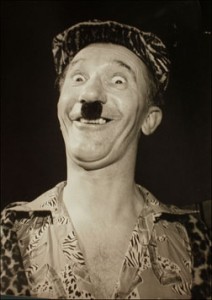 Soon everyone on stage would be talking the same way, and the audience would be in hysterics. Jackley would end the sketch by saying in his normal voice: “Oh, I’m fed up with this – let’s talk properly,” making it clear that he had been pretending to have a speech impediment just to subvert authority and have a laugh at the boss class.
Soon everyone on stage would be talking the same way, and the audience would be in hysterics. Jackley would end the sketch by saying in his normal voice: “Oh, I’m fed up with this – let’s talk properly,” making it clear that he had been pretending to have a speech impediment just to subvert authority and have a laugh at the boss class.
HIS first appearance in London was at the Alhambra in 1928 in a piano act with Joy. He turned solo in 1931, was in three Royal Variety Performances and, in the 1940s, topped bills at the Palladium and many other London theatres. He made a few films, including Demobbed (1944) for John E. Blakeley’s notorious Mancunian Films studio. Blakeley’s murky, incoherent films, made for a primarily North of England audience and starring local favourites such as Frank Randle, Norman Evans, Duggie Wakefield, Tessie O’Shea and Jimmy James, were each made in a couple of weeks with a camera that remained mostly static in long shot for minutes on end, as if faithfully recording a stage play. The scripts contained empty pages simply marked Business, and Blakeley would instruct his comedians: “Okay, lads, be funny.”
Since his performers were extemporising much of their slapstick material on the spot, with many scenes to get in the can every day, this invariably meant a lot of pointless barging about and falling down and tripping over things. That said, Mancunian movies usually returned a modest profit, and they do enshrine some famous variety routines for posterity.
Clip from Demobbed, with Norman Evans and Dan Young.</i?
Jackley comes off better than most in Demobbed, and has some quite well-structured scenes that show him to good advantage. Dressed as a guardsman, complete with bearskin hat, mini-kilt and outsize sporran, he gives an excellent display of eccentric dancing and legmania early on, followed by an “Uh-thuh-fuh-fuh-thuth” routine. There’s another bizarre scene where he insinuates himself upon a courting couple, that extraordinary neck gliding snake-like over the bemused girl’s upper body.
More from Demobbed. Nat’s first wife, Marianne Lincoln, is on his left.
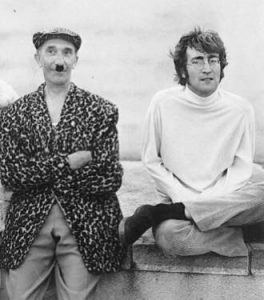 He fared better in 1956 as the star of the comparatively lavish Stars in Your Eyes, filmed in colour, which also featured Bonar Colleano and Pat Kirkwood, and cast him as an ageing music hall comic trying to come to terms with a new era in entertainment. “Bonar was a good
He fared better in 1956 as the star of the comparatively lavish Stars in Your Eyes, filmed in colour, which also featured Bonar Colleano and Pat Kirkwood, and cast him as an ageing music hall comic trying to come to terms with a new era in entertainment. “Bonar was a good 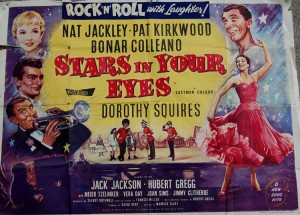 friend of mine because we both came from old circus families. But he lived too fast and died young.” (Colleano, handsome star of many British films and a nephew of Con Colleano, the first tightrope walker to perform a forward somersault on the wire, died in a car crash in 1958 aged thirty-four).
friend of mine because we both came from old circus families. But he lived too fast and died young.” (Colleano, handsome star of many British films and a nephew of Con Colleano, the first tightrope walker to perform a forward somersault on the wire, died in a car crash in 1958 aged thirty-four).
A well-remembered face (or, more likely, neck and legs) from Liverpool pantos and variety shows seen in the 1950s by the boys who would become The Beatles, in 1967 Jackley was given a showy little part in The Beatles Magical Mystery Tour as Happy Nat the Rubber Man.
In his stage heyday, the 1940s and 1950s, Nat Jackley often worked with his wife Marianne Lincoln, who provided some of his material, and stories about their stormy relationship were the stuff of backstage legend. Author and actor Michael Kilgarriff wrote that Jackley was ‘one of the sweetest-natured men we have ever encountered,’ and lamented: ‘How sad it was, during our pantomime run at the New Cardiff, to see the distress and embarrassment caused this artiste by his abusive and violent first wife, Marianne Lincoln, who at the Palace Pier Theatre, Brighton, pushed her husband down the stairs. Eventually, the ex-soubrette’s alcoholic disruptiveness caused her to be banned both from the theatre and the local hostelry, a not infrequent occurrence wherever her unfortunate spouse was playing. One management wouldn’t even have Mrs Jackley in the same town.’ (1)
BY 1972, though, Nat Jackley had sailed into calmer matrimonial waters and, when not working, lived quietly and happily with his second wife, Pamela, in Coventry. He had tried his hand at television but his extravagant comic style was quite unsuited to the medium, although in 1956 he did two shows for the BBC, Nat’s in the Belfry, co-starring the terrifying Marianne. His great success in television was still to come, a few years after I met him, and not as a comedian. By 1972 he was, with most of the other veterans here, appearing in Old Time Music Hall and seaside summer seasons.
In 1980 Nat made a charming single record, Nathaniel J, in which he told his life story in verse, to a musical background.
As Nat Jackley and Company, he and his stooges toured a knockabout sketch he called Why Should England Tremble? And there was always panto, of course. He regretted that the big clubs seemed to be taking audiences away from traditional theatres, but wasn’t at all bitter. He had officiated at the obsequies of some grand old piles. When the Empire, Leeds, shut down forever after the last night of Babes in the Wood in 1961, Jackley doffed his Dame’s wig and told the audience: “When you say goodbye to an old friend, you always take your hat off.”
Big cabaret venues, glorified working men’s clubs wealthy enough to attract top names, were in vogue in 1972. But they didn’t suit Jackley’s style. “Now I’m no good for cabaret clubs. I’m not a gag man. I’m a visual comic. I need to be up there facing the audience where they can see me properly.”
He was happy at Liverpool, though, and happy, too, to take third billing. “I don’t like to be a big fish in a small pond,” he told me. “I’m not a jealous performer like that.”
It was his 42nd panto, and he had his own approach to playing the dame. “In this pantomime I’m working as a man in skirts. I’m not a female impersonator like Danny la Rue or Dick Emery. I’m just Nat Jackley wearing a skirt. I keep as fit as possible, but when you get older the bruises show more and they last longer, and I get a bit of rheumatism in my hands. But I’ve always been busy on stage, doing the funny walks and running up and down. That way they can’t hit you when they throw things! We had one kid in the other day and when I was in the middle of a routine he stood up in the stalls and shouted at the top of his voice: ‘Oh you go and fuck off!’”
Nat Jackley laughed. It would take more than a cheeky kid to put him off his funny stride.
Thath’s all, Nat . . .
NAT was a smart old dog perfectly willing to learn a new trick or two, and it was heartening to find him, a few years after our meeting, quietly established as a film and television character actor of tremendous dignity and still, understated power. He was in the successful series When the Boat Comes In in 1977 and played the grandad, Harry Hayward, in the ten-part series The Spoils of War in 1980. He was in Tales of the Unexpected, Minder and Juliet Bravo, and in 1981 played Snout in A Midsummer Night’s Dream.
Nat Jackley gave a particularly fine, sensitive performance in the 1983 film The Ploughman’s Lunch, as despicable journalist Jonathan Pryce’s father. And when he died on September 17th, 1988, aged 79, a new generation of viewers, screenwriters, casting directors and producers was sorry to see him go. How many of them knew that the gentle old character actor they so admired had once been a famous music hall Rubber-Necked Man named Uh-thuh-fuh-fuh-thuth?
All text Copyright Stephen Dixon 2013. All illustrations, except where specified, from Stephen Dixon Collection, acquired from various sources over a 40-year period and in many cases provided by the artists themselves in the 1970s. If anyone has copyright or permission issues, please contact me.
Other sources:
(1) Grace, Beauty and Banjos, by Michael Kilgarriff (Oberon Books, 1998).
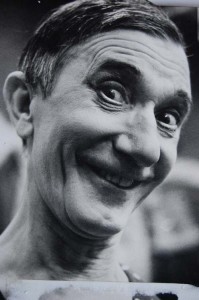
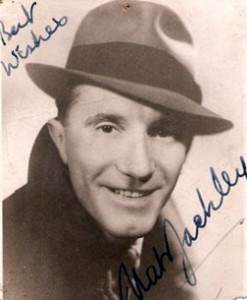
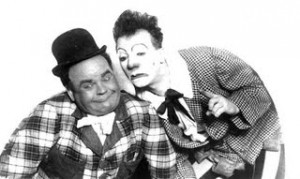

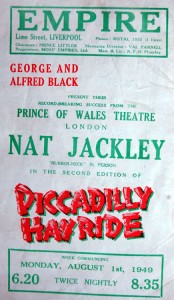

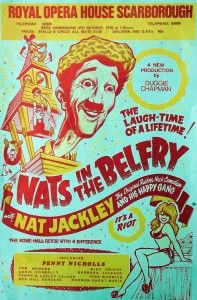
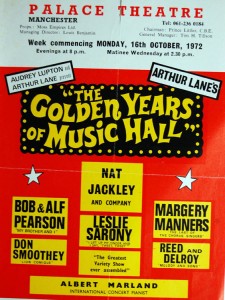
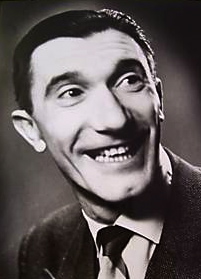
stephendee
| #
Doesn’t ring a bell with me, Stefan, tho it’s a very typical Sarony line. Anyone? Stephen
stefan Beard
| #
Just been reading the Leslie Sarony piece. Absolutely fantastic. Well done. A question if you don’t mind. Does anyone know the the title of the Leslie Sarony song that has the line “Oi ! how you gettin’ on? ” in it ?
ruskimic
| #
I do hope you can help me. I have been searching for many years for my Great Uncle Mr Albert Edward Rayner who went under the name of Dan Rayner. I believe he worked the Music Halls but I do know for sure he worked with Fred Karno. When Charlie Chaplin left Fred in America over a Pay dispute the American backers of the tour insisted that my Great Uncle Dan Rayner be called over from England to take Charlie Chaplin’s Place. It appears Dan was liked more at that time in America than Charlie was. Another man in the troupe at that time was Stan Laurel. When the show folded Dan was asked along with Stan to stay in America. As we know Stan stayed and found he fame and fortune. Dan however chose to return to England. He was last that I can find in a play Dick Wittington at the Empire Theatre advertised in the a local paper in Durham in 1948. Unfortunately I have not been able to find when or where he died. I am hoping that maybe on your search you came across some info on Dan Rayner. I live in Australia so am unable to search all the death records for England with out it costing me a fortune. So any help you maybe able to give me would be really appreciated. I know he went to America twice and once to Australia and also once to South Africa. I do know he was married to a lady named Barbara Robinson and they had a son Conrad Paul Rayner but I have been unable to find any thing out about these two members of his family. I do know they separated before 1935 and he lived with another lady named Phyliss but as to her last name I have no idea. I have been searching for nearly 10 yrs now and I don’t think there is any thing left on the net that can help me. You it would appear maybe my last chance. I will keep my fingers crossed that you did come across some info on him or you know some one that maybe able to help. He went to America in 1913 on the Lusitania and it shows at this time he is married. He then returns to America in 1914 on the ship Adriatic. I do believe he also did a radio show after 1935 for quite some time but do not know the name of that show. I do hope you can help in my search for my Great Uncle.
I also might add my great grandfather was Edwin Richard Barwick. He was also a Music Hall performer and appeared in the first Royal Command Performance. If you get the picture and Index to that even you will see him standing next to Pavlova. I would love to hear any information you may have found out about him. I do believe he was one of the first members of the charity named water rats, I know star was spelt back wards to get the rats part. Edwin did a lot of work for this charity in his day. What I would love to know is if there is any recording of Edwin Performing and if so how I would go about getting a copy or seeing any recording. I do have a photo copy of an old theatre bill with my grandfathers name boldly written on it. Again any help would be appreciated.
All the best and I look forward to hearing back from you in the near future
Kim Rayner
my email address is ruskimic@yahoo.com.au